News
Bahçıvan at ICI Assembly: “Success Formula for Family-Owned Enterprises: Institutionalization”
- 26.10.2016
- News
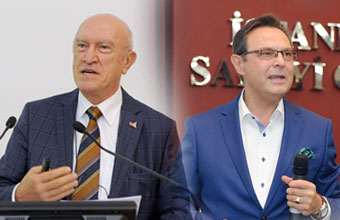
The ordinary monthly assembly meeting of Istanbul Chamber of Industry (ICI) was held on October 26, 2016 under the main theme “The Key Role of Institutionalization for Sustainable Economic Growth and Success of Family-Owned Enterprises and for National Economy and Industry” at Odakule Assembly Hall. The October Assembly chaired by Hasan Büyükdede, ICI Vice President of Assembly, hosted Bülent Akarcalı, Former Minister of Health and Tourism, and Dr. Haluk Alacaklıoğlu, Chairman of the Board at Aile Şirketi Yönetimi Ltd (Family Business Governance Ltd.).
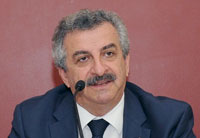
Hasan Büyükdede,
ICI Vice President of Assembly
A short movie made by the Union of Chambers and Commodity Exchanges of Türkiye on the July 15 coup attempt was screened before starting with the Assembly agenda items. Hasan Büyükdede, ICI Vice President of Assembly, delivered the opening speech at the Istanbul Chamber of Industry’s ordinary assembly for October. Remarking on the movie, Büyükdede commemorated the July 15 martyrs and wished that Türkiye would never be faced with such troubled times. After celebrating the 93rd anniversary of the Republic of Türkiye, he invited Erdal Bahçıvan, ICI Chairman, to introduce the Assembly agenda.
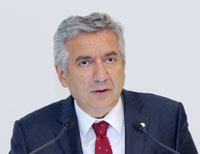
Erdal Bahçıvan, ICI Chairman
Speaking about the global economic outlook, ICI Chairman Bahçıvan noted that global debt’s mounting to unprecedented high levels amid the global growth at creep speed, remarkably limited governments’ range of motion. According to IMF’s latest fiscal monitor, global debt, which included public, household and non-financial private sector liabilities, hit $152 trillion, accounting for 225 percent of the world GDP, said Bahçıvan, and added that as two-thirds consisted of the private sector liabilities, the problem was lying in real sector.
Bahçıvan stated that a high global private debt is bolstering up financial vulnerability while limiting consumption and investments, hence restricting the growth.
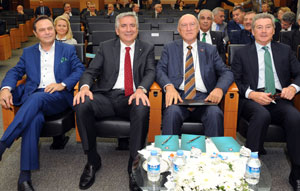
Haluk Alacaklıoğlu, Erdal Bahçıvan,
Bülent Akarcalı, Ömer Dinçkök
Describing Türkiye’s public finance as in good condition, Bahçıvan noted that this year’s public debt to Gross Domestic Product ratio is expected to be 31.7 percent, which places Türkiye to the 39th place among 181 countries in terms of debt outlook, and in the third best position among the thirty countries with the highest public debt stock.
Bahçıvan reminded that private sector suffers from a higher debt level. Still quoting the IMF report, Bahçıvan informed that private sector’s debt burden rose by approximately one-third of GDP in the post-global financial crisis atmosphere, highlighting that Türkiye ranks sixth among developing countries with the highest increase in private sector debt to GDP ratio.
Stressing that they need a faster growth, Bahçıvan said that the industry, being the economy’s driving power, must grow, produce and invest more. Bahçıvan underlined that both the global atmosphere of uncertainty and the high costs suppress appetite for investment.

Bahçıvan reminded that as Istanbul Chamber of Industry, lately, they have been highlighting in various platforms that new and large-scale investments of the private sector should be supported, even at the expense of a slight increase in budget deficit.
Bahçıvan continued his remarks:
“We are glad to see that the recently announced 2017-2019 Midterm Program and the 2017 draft budget submitted to the Turkish Grand National Assembly last week imply that our request would be met. It is indeed a pleasing development that the draft budget features private sector investment leveraging policies such as augmenting investment allowances to TL 78 billion, allocating TL 5.8 billion to the R&D and innovation budget, and implementing a TL 1.1 billion stimulus package for SMEs. In addition, we believe that government’s efforts towards developing the corporate infrastructure, such as draft laws on patent, expert witness, chattel mortgage, Istanbul Financial Center, income and corporate tax, will have a positive impact on the business and investment climate.”

Bahçıvan also remarked on the main agenda for the October Assembly: family-owned enterprises. He stressed that as long as the family-owned enterprises, being major contributors to national income and the backbone of the economy, are healthy and successful, the national economy will follow.
Regarding family-owned enterprises, sustainability is about passing on economic activities from one generation to the next, and family businesses have a deeper foresight capacity than other investments and initiatives, according to Bahçıvan. He added that the founding generation’s legacy may live for centuries by protecting family values and passing on the know-how and experience. Defining sustainability as a challenging goal, Bahçıvan informed that 15 percent of the family-owned enterprises worldwide could make it until the third generation, and their average life span is approximately 25 years.
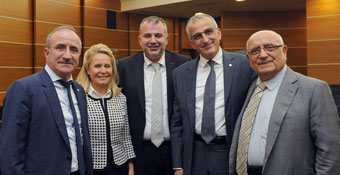
Bahçıvan said that around 40 percent of the Turkish family-owned enterprises were run by the first generation, 50 percent by second and only 13 percent by third, whereas those that made it to the fourth generation accounted for as low as 2 percent. Bahçıvan, noting that in Türkiye there are only 20 companies that’s older than one hundred years, drew attention to Turkish companies’ inability when it comes to sustainability.
“Looking at long-lived family businesses, we see that they adopted strong corporate organizations. Therefore, the formula to attain sustainable success is to become corporate. Be that as it may, to be frank, this concept of institutionalization has always had worrying connotations for family-owned enterprises. The problem is that institutionalization was always perceived as a process that moved the generation, who originally established and developed the company, aside and make them stay as audience. As this misperception has been clearing away recently, companies make bolder moves towards institutionalization,” noted Bahçıvan.
He went on to say that institutionalization did not mean handing over the company management to professionals and losing control, but instead, it aimed to enable the company continue to exist and grow independent from individual names.
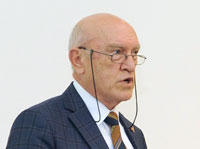
Bülent Akarcalı, Former Minister of Health and Tourism
Taking the floor after ICI Chairman Erdal Bahçıvan; Bülent Akarcalı, Former Minister of Health and Tourism advised industrialists about institutionalization. Noting that institutionalization establishes an environment of mutual trust in domestic markets and increases company’s credibility, Akarcalı added that the Turquality standards raised the bar in this area and new grades must be created for those unable to reach this level. Each company must undergo institutionalization in a peculiar manner, and any such process that leaves out company founder’s knowledge and skills is doomed to fail, according to Akarcalı. Akarcalı said that institutionalization would operationalize a company, hence sparing its founder more time to prepare the company for the future. He compared this journey to that of escalation from captain to ship owner.
Akarcalı stated that institutionalization often scared away company owners who assumed this transition to be difficult, high-cost and onerous and one requiring larger staff. He noted that this process was actually much easier in practice and many enterprises were actually much closer to institutionalization than they assume. Akarcalı said that having better planned and scheduled operations in your day to day business, while listening to your employees’ insights and feedback, and writing these procedures and principles down are major steps to institutionalization.
He then pointed out that institutionalization is not a hardware that one can simply purchase from third parties and mount on the company; but it’s an inner mechanism. “The key to building an institutionalized company organization is setting up a human resources department. Because, ‘Within people lies efficiency’. Human Resources Department is the major instrument in fostering efficiency and profitability. Each employee must have a specific job definition”, noted Akarcalı.
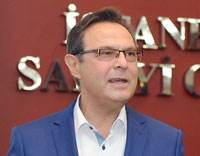
Dr. Haluk Alacaklıoğlu, Chairman of the Board at Aile Şirketi Yönetimi Ltd.
ICI Assembly’s other guest related to this month’s agenda, Dr. Haluk Alacaklıoğlu, Chairman of the Board of Aile Şirketi Yönetimi Ltd. delivered a presentation on institutionalization of family-owned enterprises. Noting that 73 percent of consumers trust in family-owned enterprises, Alacaklıoğlu added that well-managed and institutionalized family-owned enterprises created more added value than publicly owned companies. He defined a family-owned enterprise as an entity in which family shareholders could reassign the Executive Board President.

Talking about distinguishing family expectations from business requirements, Alacaklıoğlu reminded that families have emotional expectations and unconditional acceptance, whereas the business life focuses on values such as profit, growth and accountability. Alacaklıoğlu compared family-owned enterprise to an onion, on the grounds of its layered structure and need to be peeled for achieving success, yet it could bring tears along.
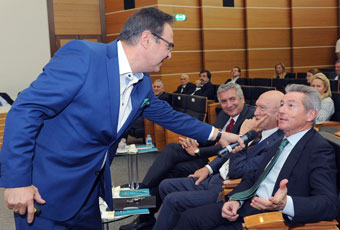
Proposing the adoption of a corporate family constitution, and institutionalization as a solution to the problems of family-owned enterprises, Alacaklıoğlu stressed that 60 percent of the institutionalization consists of a handover plan. Referring to visions of the next generation young people being different than ours, Alacaklıoğlu underlined that this intergenerational gap must be seen as richness. Alacaklıoğlu described future steps to institutionalization as values and principles, developing a shared business vision, establishment of a family mission, setting rules, and bringing the corporate management to life. Delivering an interactive speech, Alacaklıoğlu then answered ICI Assembly members’ questions about their family enterprises. Listening to the audience’s experiences of their own family enterprises, he then exchanged comments with them.
Following the speeches, ICI Assembly members took the floor to elaborate on the agenda.